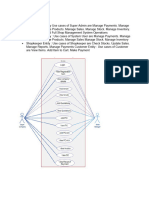0 ratings0% found this document useful (0 votes)
12 viewsSocial Studies
Social Studies
Uploaded by
SOMOSCOThe document contains a 20 question multiple choice exam on social studies topics like physical features, landforms, social environment, safety procedures, and environmental problems for students in JSS 1. It tests students' understanding of concepts like highlands, lakes, valleys, social relationships, safety in various settings, and causes of problems like droughts and floods.
Copyright:
© All Rights Reserved
Available Formats
Download as DOCX, PDF, TXT or read online from Scribd
Social Studies
Social Studies
Uploaded by
SOMOSCO0 ratings0% found this document useful (0 votes)
12 views3 pagesThe document contains a 20 question multiple choice exam on social studies topics like physical features, landforms, social environment, safety procedures, and environmental problems for students in JSS 1. It tests students' understanding of concepts like highlands, lakes, valleys, social relationships, safety in various settings, and causes of problems like droughts and floods.
Original Description:
exam
Original Title
Social studies
Copyright
© © All Rights Reserved
Available Formats
DOCX, PDF, TXT or read online from Scribd
Share this document
Did you find this document useful?
Is this content inappropriate?
The document contains a 20 question multiple choice exam on social studies topics like physical features, landforms, social environment, safety procedures, and environmental problems for students in JSS 1. It tests students' understanding of concepts like highlands, lakes, valleys, social relationships, safety in various settings, and causes of problems like droughts and floods.
Copyright:
© All Rights Reserved
Available Formats
Download as DOCX, PDF, TXT or read online from Scribd
Download as docx, pdf, or txt
0 ratings0% found this document useful (0 votes)
12 views3 pagesSocial Studies
Social Studies
Uploaded by
SOMOSCOThe document contains a 20 question multiple choice exam on social studies topics like physical features, landforms, social environment, safety procedures, and environmental problems for students in JSS 1. It tests students' understanding of concepts like highlands, lakes, valleys, social relationships, safety in various settings, and causes of problems like droughts and floods.
Copyright:
© All Rights Reserved
Available Formats
Download as DOCX, PDF, TXT or read online from Scribd
Download as docx, pdf, or txt
You are on page 1of 3
NASIHA ACADEMY EDUCATIONAL SERVICES
2nd TERM EXAMINATION 2023
SUBJECT: SOCIAL STUDIES
CLASS: JSS 1
Instruction: Answer all question
1. Which is not true of physical features? Most of them can be
________ (a) eaten (b) seen (c) touched (d) felt
2. Physical features are _______ (a) both man-made and nature
created (b) only man-made (c) artificial (d) only nature created
3. These are physical features except one (a) newspaper (b) lake
(c) valley (d) tree
4. A part of the land which falls below the general level of the land is
called what? ________ (a) lowland (b) a hill (c) a plateau (d) a
bridge
5. A good example of highland in Nigeria is ________ (a) Jos Plateau
(b) Lagos Island (c) Lake Chad (d) Between River, Sokoto and
Zamfara
6. A part of the land which rises above the general level of the ground
is called _______ (a) high land (b) lake (c) hill (d) vegetation
7. A large body of water surrounded by land is known as ______ (a)
lake (b) lowland (c) a highland (d) an island
8. A stretch of land between hills or mountains is called ______ (a)
island (b) valley (c) rock (d) ocean
9. The type of plants which grow in an area of land differentiating the
area from their land is _______ (a) vegetation (b) pawpaw (c)
climate (d) leaves
10. Highlands are useful to man in the following ways except one
(a) As shelters and places of safety (b) As sources of rivers
(c) For constructing railway lines (d) As a source of mineral resources
11. Social environment refers to the _________ (a) social setting in
which people live and relate together (b) physical setting in which
people live (c) social setting in which people live (d) none of the
above
12. Social relationship is the _________ (a) relationship among people in
society (b) relationship between two people (c) interaction among
couple in society (d) interaction between couples
13. Man influences his social environment by _________ (a) creating
laws (b) obeying laws (c) going to school (d) sleeping
14. Home safety can be encouraged through the following except
_______ (a) to prevent fall (b) to encourage carefree attitude (c) to
prevent burns and scalds (d) to prevent poisoning
15. Safety means in the school have to do with the following except to
_______ (a) know travel routes to and from the school (b) learn the
school emergency procedures (c) talk with friends when class is
going on (d) know and following school security and safety measures
16. As a driver, you must follow the following procedures in driving
except _______ (a) be alert, watch for pedestrians and other road
users (b) be fully drunk before driving (c) be careful with
cyclists while driving (d) be patient drive within the speed limit and
avoid aggressive maneuvers
17. Pedestrians should observe the _______ when walking along the
main road (a) on coming vehicles (b) animals on the roads (c)
entertainers on the road (d) things on the ground
18. Mountains are highlands above (a) 200 metres (b) 400 metres
(c) 600 metres (d) 450 metres
19. Who are cyclists? (a) pedestrians (b) motorists (c) okada riders
(d) none of the above
20. Safety is defined as _______ (a) a state in which the risk of harm to
persons or of property damage is reduced (b) a state in which the
risk of harm is increased (c) promotion of negative behaviours among
the youth (d) a situation whereby accident are encouraged
SECTION B
Answer only three questions
1. What is Social Environment
2. Using a table give example of man-made and natural physical
environment
3. Write short notes on the following environmental problems
i. Drought
ii. Floods
iii. Pollution
4. Define Social Relationships
You might also like
- The Subtle Art of Not Giving a F*ck: A Counterintuitive Approach to Living a Good LifeFrom EverandThe Subtle Art of Not Giving a F*ck: A Counterintuitive Approach to Living a Good LifeRating: 4 out of 5 stars4/5 (5935)
- The Gifts of Imperfection: Let Go of Who You Think You're Supposed to Be and Embrace Who You AreFrom EverandThe Gifts of Imperfection: Let Go of Who You Think You're Supposed to Be and Embrace Who You AreRating: 4 out of 5 stars4/5 (1106)
- Never Split the Difference: Negotiating As If Your Life Depended On ItFrom EverandNever Split the Difference: Negotiating As If Your Life Depended On ItRating: 4.5 out of 5 stars4.5/5 (879)
- Grit: The Power of Passion and PerseveranceFrom EverandGrit: The Power of Passion and PerseveranceRating: 4 out of 5 stars4/5 (598)
- Hidden Figures: The American Dream and the Untold Story of the Black Women Mathematicians Who Helped Win the Space RaceFrom EverandHidden Figures: The American Dream and the Untold Story of the Black Women Mathematicians Who Helped Win the Space RaceRating: 4 out of 5 stars4/5 (925)
- Shoe Dog: A Memoir by the Creator of NikeFrom EverandShoe Dog: A Memoir by the Creator of NikeRating: 4.5 out of 5 stars4.5/5 (545)
- The Hard Thing About Hard Things: Building a Business When There Are No Easy AnswersFrom EverandThe Hard Thing About Hard Things: Building a Business When There Are No Easy AnswersRating: 4.5 out of 5 stars4.5/5 (353)
- Elon Musk: Tesla, SpaceX, and the Quest for a Fantastic FutureFrom EverandElon Musk: Tesla, SpaceX, and the Quest for a Fantastic FutureRating: 4.5 out of 5 stars4.5/5 (476)
- Her Body and Other Parties: StoriesFrom EverandHer Body and Other Parties: StoriesRating: 4 out of 5 stars4/5 (831)
- The Emperor of All Maladies: A Biography of CancerFrom EverandThe Emperor of All Maladies: A Biography of CancerRating: 4.5 out of 5 stars4.5/5 (274)
- The Little Book of Hygge: Danish Secrets to Happy LivingFrom EverandThe Little Book of Hygge: Danish Secrets to Happy LivingRating: 3.5 out of 5 stars3.5/5 (419)
- The World Is Flat 3.0: A Brief History of the Twenty-first CenturyFrom EverandThe World Is Flat 3.0: A Brief History of the Twenty-first CenturyRating: 3.5 out of 5 stars3.5/5 (2271)
- The Yellow House: A Memoir (2019 National Book Award Winner)From EverandThe Yellow House: A Memoir (2019 National Book Award Winner)Rating: 4 out of 5 stars4/5 (99)
- Devil in the Grove: Thurgood Marshall, the Groveland Boys, and the Dawn of a New AmericaFrom EverandDevil in the Grove: Thurgood Marshall, the Groveland Boys, and the Dawn of a New AmericaRating: 4.5 out of 5 stars4.5/5 (270)
- The Sympathizer: A Novel (Pulitzer Prize for Fiction)From EverandThe Sympathizer: A Novel (Pulitzer Prize for Fiction)Rating: 4.5 out of 5 stars4.5/5 (122)
- Team of Rivals: The Political Genius of Abraham LincolnFrom EverandTeam of Rivals: The Political Genius of Abraham LincolnRating: 4.5 out of 5 stars4.5/5 (235)
- A Heartbreaking Work Of Staggering Genius: A Memoir Based on a True StoryFrom EverandA Heartbreaking Work Of Staggering Genius: A Memoir Based on a True StoryRating: 3.5 out of 5 stars3.5/5 (232)
- Design and Implementation of Students Records WebsiteDocument30 pagesDesign and Implementation of Students Records WebsiteSOMOSCONo ratings yet
- On Fire: The (Burning) Case for a Green New DealFrom EverandOn Fire: The (Burning) Case for a Green New DealRating: 4 out of 5 stars4/5 (75)
- The Unwinding: An Inner History of the New AmericaFrom EverandThe Unwinding: An Inner History of the New AmericaRating: 4 out of 5 stars4/5 (45)
- CivicDocument2 pagesCivicSOMOSCONo ratings yet
- MathematicsDocument2 pagesMathematicsSOMOSCONo ratings yet
- Uses Case DiagramDocument2 pagesUses Case DiagramSOMOSCONo ratings yet
- AgricultureDocument2 pagesAgricultureSOMOSCONo ratings yet
- Basic TechDocument2 pagesBasic TechSOMOSCONo ratings yet
- Home EconomicsDocument2 pagesHome EconomicsSOMOSCONo ratings yet
- PhysicsDocument2 pagesPhysicsSOMOSCONo ratings yet
- Umar Bala Com115 AssDocument6 pagesUmar Bala Com115 AssSOMOSCONo ratings yet
- CivicDocument2 pagesCivicSOMOSCONo ratings yet
- MathsDocument2 pagesMathsSOMOSCONo ratings yet
- ChemistryDocument2 pagesChemistrySOMOSCONo ratings yet
- Nurs 3309 Medico-Surgical Nursing 1Document118 pagesNurs 3309 Medico-Surgical Nursing 1SOMOSCONo ratings yet
- Nurs 3401 General MicrobiologyDocument132 pagesNurs 3401 General MicrobiologySOMOSCONo ratings yet
- The ANS and Adrenal MedullaDocument24 pagesThe ANS and Adrenal MedullaSOMOSCONo ratings yet
- Machine LearningDocument13 pagesMachine LearningSOMOSCONo ratings yet
- Importance of Business Policy From The Viewpoint of Career ChoiceDocument5 pagesImportance of Business Policy From The Viewpoint of Career ChoiceSOMOSCONo ratings yet
- Com 122 Pract.Document9 pagesCom 122 Pract.SOMOSCONo ratings yet
- Advance Radio and Television Techniques For HND IIDocument14 pagesAdvance Radio and Television Techniques For HND IISOMOSCONo ratings yet
- Business Project TopicsDocument4 pagesBusiness Project TopicsSOMOSCONo ratings yet
- Advance Radio and Television Techniques For HND IIDocument14 pagesAdvance Radio and Television Techniques For HND IISOMOSCONo ratings yet
- Computer Project TopicsDocument8 pagesComputer Project TopicsSOMOSCONo ratings yet
- HND 1A Interpersal Communication Handout RealDocument19 pagesHND 1A Interpersal Communication Handout RealSOMOSCONo ratings yet
- Internet QuestionDocument4 pagesInternet QuestionSOMOSCONo ratings yet
































































